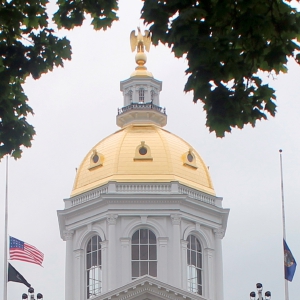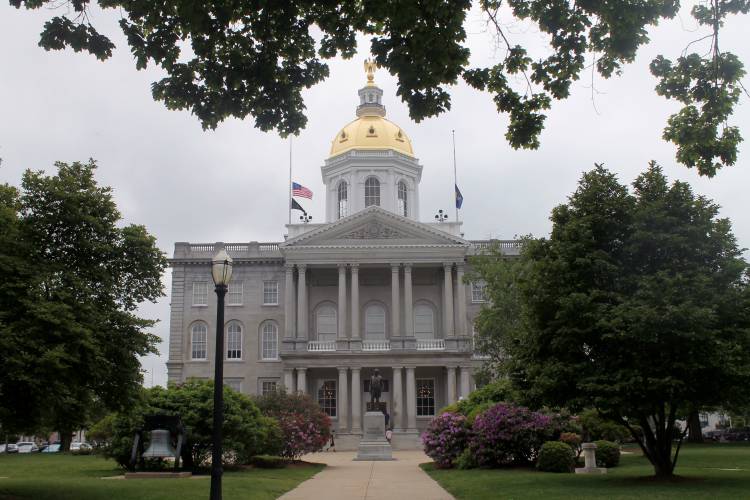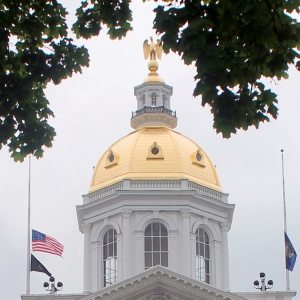Latest News
 Budget Cuts Impact Mental Health Resources on Campus
Budget Cuts Impact Mental Health Resources on Campus
 Monitor Sports Podcast — Catching up on the spring
Monitor Sports Podcast — Catching up on the spring

For some older Jewish professors at Dartmouth and UNH, opposition to campus arrests feels personal
After police pushed Dartmouth professor Annelise Orleck to the ground and arrested her in an exchange that has since gone viral, an officer told her partner, “Age doesn’t matter if there’s bad behavior,” she said.“They clearly were told it was okay to...

ACLU argues “Keep New England White” banner hung on highway overpass is protected speech
To the ACLU of New Hampshire the phrase “Keep New England White” is a racist and detestable statement that signals to people of color that they are not welcome here. It’s also protected speech under the First Amendment.In a “friends-of-the-court”...
Most Read
 Neighboring landowner objection stalls Steeplegate redevelopment approval
Neighboring landowner objection stalls Steeplegate redevelopment approval
 Northeast Coffee Festival comes to Concord this weekend
Northeast Coffee Festival comes to Concord this weekend
 Hopkinton tries to nab out-of-town trash bandits
Hopkinton tries to nab out-of-town trash bandits
 On the Trail: Democrat Maggie Goodlander jumps into race to succeed Kuster
On the Trail: Democrat Maggie Goodlander jumps into race to succeed Kuster
 NH Senate panel frowns on bill to ease vehicle inspection requirements
NH Senate panel frowns on bill to ease vehicle inspection requirements
 Steeplegate project to reopen to public comment as developer seeks to reduce required parking
Steeplegate project to reopen to public comment as developer seeks to reduce required parking
Editors Picks
 A turbulent 50-year history: Inside the rise and fall of a tiny Catholic college in Warner
A turbulent 50-year history: Inside the rise and fall of a tiny Catholic college in Warner
 Hopkinton tries to nab out-of-town trash bandits
Hopkinton tries to nab out-of-town trash bandits
 The murky world of town and city flags in NH
The murky world of town and city flags in NH
 Hopkinton chocolatier transforms chocolates into works of art
Hopkinton chocolatier transforms chocolates into works of art
Sports

Monitor Sports launches new, once-a-week newsletter
To enhance our coverage of local sports, Monitor Sports has launched a new sports newsletter that will hit your inbox every Friday. The email from Eric Rynston-Lobel will provide an overview of the previous week of feature stories and game coverage...
 Boys’ lacrosse: Through the lumps, Concord coach thinks young team is ahead of schedule
Boys’ lacrosse: Through the lumps, Concord coach thinks young team is ahead of schedule
 High schools: Friday and Saturday results
High schools: Friday and Saturday results
Opinion

Opinion: Preserving our historic properties
Sarah Mathieu lives in Concord. I am a Concord resident that has renovated apartments in a historic multifamily house downtown. The house was built around 1850 and occupied by Steven K. Blaney, a Concord Coach painter for the Abbot-Downing company.It...
 Opinion: Invest in child care for NH families
Opinion: Invest in child care for NH families
 Opinion: Protecting NH from PFAS
Opinion: Protecting NH from PFAS
 Opinion: Thank goodness for New Hampshire teachers
Opinion: Thank goodness for New Hampshire teachers

Politics

Transgender sports ban receives Senate committee support
A controversial bill that would ban transgender girls from participating on NHIAA- sanctioned girls’ sports teams in New Hampshire is expected to be voted on by the Senate next week, after it received support from the Senate’s Education Committee on...
 Charities will not have to pay rent to casinos under new law
Charities will not have to pay rent to casinos under new law
 Sununu says he’ll support Trump even if he’s convicted
Sununu says he’ll support Trump even if he’s convicted
 NH mayors want more help from state on homelessness prevention funds
NH mayors want more help from state on homelessness prevention funds
Arts & Life

Found a baby bird? Here’s what to do
It is that time of year when vibrant flowers start to bloom, painting landscapes with their colors, and the air is filled with the sweet melodies of songbirds, that encounters with abandoned baby birds or squirrels on the ground become more...
 Northeast Coffee Festival comes to Concord this weekend
Northeast Coffee Festival comes to Concord this weekend
 Henniker Handmade & Homegrown
Henniker Handmade & Homegrown
 Colonial Theatre Laconia presents Piff the Magic Dragon
Colonial Theatre Laconia presents Piff the Magic Dragon
 The Loft at Hermit Woods presents Pete Kilpatrick
The Loft at Hermit Woods presents Pete Kilpatrick
Obituaries
 Jean Cleverly
Jean Cleverly
Canterbury, NH - Jean Cleverly, age 76, of Canterbury, passed away peacefully surrounded by her children on Monday, May 6, 2024. Jean was born in Toledo, Ohio on April 12, 1948. In the mid 1980's Jean advanced her legal administration ... remainder of obit for Jean Cleverly
 Ellen Victoria McEvoy
Ellen Victoria McEvoy
Concord, NH - Ellen Victoria McEvoy, age 83, of Clinton Street, passed away on Sunday, May 5, 2024 at her home. She was born in Nashua, NH the daughter of the late Weston and Edith (Holt) McEvoy. Ellen lived in St. Paul, MN for alm... remainder of obit for Ellen Victoria McEvoy
 Valerie Sue Pearson
Valerie Sue Pearson
Cook, MN - Valerie Sue Pearson, 64, of Cook, MN passed away on Tuesday April 30, 2024. Valerie was born October 30, 1958 to Edgar and Zula (Corson) Riel in Concord, NH. She grew up and attended school in Pittsfield, graduating from Pitt... remainder of obit for Valerie Sue Pearson
 Timothy James Nelson
Timothy James Nelson
Brentwood, NH - Timothy "Tim" Nelson, 57, of Three Ponds Drive, passed away on Saturday, May 4, 2024, at Brigham and Women's Hospital surrounded by his loving family. Tim Nelson was a man who loved his family. His unwavering dedication... remainder of obit for Timothy James Nelson

 Driven by capital projects, city budget proposal would boost spending by $40 million
Driven by capital projects, city budget proposal would boost spending by $40 million
 NH House passes bill that would boost caps on wrongful death claims
NH House passes bill that would boost caps on wrongful death claims
 Lawmakers hear some good news about state revenues – and reasons for concern
Lawmakers hear some good news about state revenues – and reasons for concern
 How has Hopkinton, one of the smallest public schools in New Hampshire, become such a lacrosse powerhouse?
How has Hopkinton, one of the smallest public schools in New Hampshire, become such a lacrosse powerhouse?
 Opinion: An opportunity to help law enforcement protect children
Opinion: An opportunity to help law enforcement protect children
 High schools: Concord girls’ 4x100-meter relay sets school record at Merrimack Invite, plus more track, baseball, lax and tennis results
High schools: Concord girls’ 4x100-meter relay sets school record at Merrimack Invite, plus more track, baseball, lax and tennis results
 Adam Montgomery sentenced to minimum 56 years on murder charges in young daughter’s death
Adam Montgomery sentenced to minimum 56 years on murder charges in young daughter’s death

 High schools: Concord baseball tops Memorial 11-1, plus more results from Wednesday
High schools: Concord baseball tops Memorial 11-1, plus more results from Wednesday Softball: Professional and precise, Coe-Brown continues dominant start to title-defense season
Softball: Professional and precise, Coe-Brown continues dominant start to title-defense season Opinion: The slippery slope that should scare us? The trend of legislatures getting involved in personal medical decisions.
Opinion: The slippery slope that should scare us? The trend of legislatures getting involved in personal medical decisions. House passes bill to raise minimum marriage age to 18, sending it to governor
House passes bill to raise minimum marriage age to 18, sending it to governor
